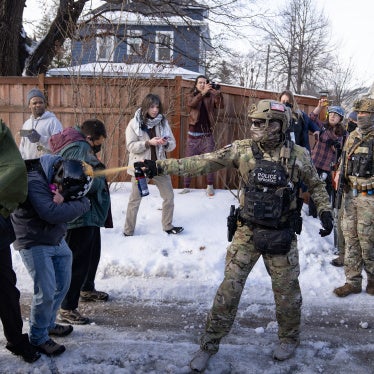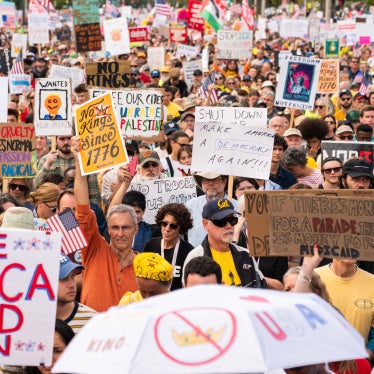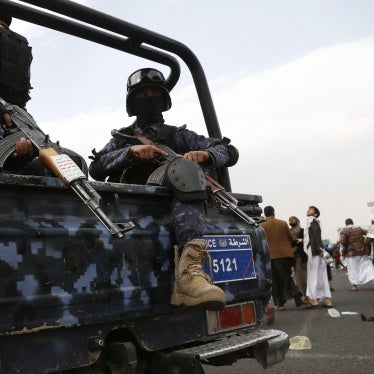In a letter sent to the U.S. Justice Department on March 8, Human Rights Watch's California Committee called on the agency's Civil Rights Division to insist on significant changes in the Los Angeles Police Department (LAPD).
The Justice Department is now conducting a "pattern or practice" inquiry. Under its civil powers, the Justice Department may demand reforms of any department exhibiting a "pattern or practice" of police misconduct.
"The Rampart police scandal has exposed our city's dirty secret to the world," said Mike Farrell, co-chair of the California Committee, "While many wanted to believe that changes following the Christopher Commission's report had solved our problems, too many residents of Los Angeles knew better from painful experience. Our residents have waited long enough for suggested reforms to take hold - it is now time for the Justice Department to insist that they do."
The letter is co-signed by a number of prominent Southern Californians, including leading religious, businesspeople, lawyers, health professionals and motion picture and television industry executives who support Human Rights Watch, an international monitoring organization based in New York.
The Committee urged the Justice Department to require that the LAPD and the city of Los Angeles:
- Create an independent commission to investigate all aspects of the operations of the anti-gang Community Resources Against Street Hoodlums (CRASH) unit. The commission should also review the Christopher Commission report, its follow-up reports, and the findings of the LAPD's internal Board of Inquiry report, made public on March 1.
- It should create a "plan of action" to implement recommendations in those, and its own, reports. The commission should also investigate the reported improper cooperation between CRASH Rampart officers and the Immigration and Naturalization Service (INS), and should assign responsibility for these violations, which may involve the FBI, senior INS officials, and the city government.
- Redefine the LAPD's anti-gang goals and strategies. Significant improvements in recruitment standards, training, and oversight must be made. The LAPD must also welcome community input regarding more effective and humane ways to combat gang violence.
- Create an independent civilian review board, tasked with receiving complaints, investigating complaints and determining whether they merit disciplinary action. The review board should have subpoena powers, be fully staffed and funded, and its disciplinary recommendations should be accepted and acted upon by LAPD officials absent compelling reasons not to do so.
- Create and utilize an effective "early warning system."
- Support the creation of a special prosecutor's office for the County of Los Angeles.
- Reform officer-involved shooting (OIS) investigative procedures that allegedly allowed CRASH officers to cover-up unjustified shootings. The Inspector General's office should on the scene at OIS investigations and should be responsible for ensuring that proper investigative techniques are followed.
- Require full support and enhanced resources for the Inspector General's office.
- Provide confidentiality for "whistle-blowers."
The letter also requests that the Justice Department bring federal criminal civil rights charges against the subject officers under 18 USC §§ 241 and 242 if the District Attorney's office fails to pursue any case vigorously and thoroughly.
March 7, 2000
Mr. Bill Lann Lee
Acting Assistant Attorney General
Civil Rights Division
Department of Justice
10th and Constitution Ave., N.W.
Washington, DC 20530
Dear Assistant Attorney General Lee:
As the California Committee of Human Rights Watch, an organization deeply concerned about police abuse in the United States, we are writing to express our support for your "pattern or practice" inquiry of the Los Angeles Police Department (LAPD). It is our understanding that your office's Special Litigation Section, together with the U.S. Attorney's Office for the Central District of California, is now investigating a broad range of abuse allegations, including those involving the anti-gang Community Resources Against Street Hoodlums (CRASH) unit based at the Rampart Division.
As Human Rights Watch described in its July 1998 report, Shielded from Justice: Police Brutality and Accountability in the United States, we believe that your civil powers under the "pattern or practice" statute are essential tools to improve police behavior and oversight. Because the LAPD has repeatedly demonstrated its inability to curtail abuses or hold brutal officers accountable, and because many incidents of police abuse involving LAPD officers have received national attention, it is imperative that your inquiry lead to significant and rapid improvements. Otherwise, we fear that future "pattern or practice" investigations and negotiations could be severely undermined. Furthermore, as an organization monitoring human rights around the world, we know that the LAPD's conduct attracts intense attention abroad and, when its conduct fails to meet international human rights standards, exposes the United States to intense criticism from other countries and undermines U.S. efforts internationally to promote human rights.
We strongly urge that you to consider the following recommendations as part of your reforms:
Independent Commission:
Require the creation of an independent commission to investigate all aspects of the operations of the anti-gang unit, with a specific focus on its personnel working out of the Rampart Division. Any investigation should not, however, be limited to this unit if evidence leads investigators elsewhere. The commission, which ideally must enjoy the full cooperation and support of city officials, the Los Angeles Police Commission, the LAPD, and the district attorney's office (a condition made more problematic by the City Council's recent decision against same), should investigate all allegations made by CRASH personnel regarding their own and other officers' misconduct, and should investigate all allegations made by residents of affected neighborhoods or other sources of information.
The commission must examine the role of police supervisors who failed to identify abusive officers, district attorneys' office personnel who used tainted testimony and evidence provided by corrupt and brutal officers, and the police commission's failure to identify problems within the anti-gang unit. All those against whom there is evidence of misconduct or negligence must be held accountable.
The commission should also review the Christopher Commission report, and its follow-up reports, to determine which recommendations still require action. It should also review the findings of the LAPD's internal board of inquiry report on the Rampart Division, made public on March 1, and should assist in a "plan of action" to implement recommendations in that report.
The commission should make concrete recommendations that the police department must implement within a set time-period. The commission should resemble the 1991 Christopher Commission in composition and in producing a public report on its findings. This commission must remain in place, in a smaller but functional form, until all of its policy recommendations are implemented.
The commission should also investigate the reported improper cooperation between CRASH Rampart officers and the Immigration and Naturalization Service (INS). It has been alleged that approximately 160 persons were deported and another forty were criminally prosecuted for illegal re-entry following improper information-sharing between the INS and the Rampart CRASH unit during 1997 and 1998. INS agents allege that the Rampart CRASH unit violated a city ordinance, known as Special rule 40, which prohibits police from initiating actions to determine whether an individual is in the country illegally. Concerns have also been raised regarding INS agents' possible involvement in other misconduct by the Rampart CRASH unit. At this time, responsibility for these violations has not been determined, but it appears that the FBI, senior INS officials, and the city government may all have been involved in ordering or encouraging these activities.
Reform anti-gang strategies:
We are pleased to learn that Chief Parks has decided to abolish the CRASH unit as it now exists. Through its "us vs. them" hostile attitude regarding city residents, brutal and corrupt tactics, and its supervisors' tolerance of a broad range of misconduct, the unit and its mission were irrevocably discredited. It is incumbent upon the LAPD, with guidance and instructions from your office, to re-think its anti-gang policies and tactics. Significant improvements regarding recruitment standards, training, and oversight must be made. The LAPD must also welcome community input regarding more effective and humane ways to combat gang violence.
Civilian Review Board:
Require the creation of an independent civilian review board tasked with receiving complaints, investigating complaints and determining whether they merit disciplinary action. The review board should have subpoena powers, be fully staffed and funded, and its disciplinary recommendations should be accepted and acted upon absent compelling reasons to the contrary.
Create and utilize an effective "early warning system":
Order the police department to implement immediately a functional early warning tracking system that, among other purposes, identifies officers and their units against whom repeated citizen or internal complaints or civil lawsuits are filed. Trends in types of complaints must also be analyzed. Information from this tracking system, including the police department's actions to correct the problems identified, must be made available to the public while protecting privacy rights of police personnel. This type of system was recommended in the Christopher Commission report, but has not yet been implemented properly.
Special Prosecutor's office:
Require the creation of a special prosecutor's office for the County of Los Angeles. This office should be responsible for investigating allegations of corruption and brutality, and for prosecuting officers. The creation of such an office would overcome the problem arising from possible bias on the part of the district attorney's office in favor of officers with whom it typically works to prosecute civilians accused of crimes. It would remove a conflict of interest in cases in which officers are accused of lying, framing, or fabricating evidence to support a case prosecuted by the district attorney's office. It would also allow prosecutors to gain expertise in difficult cases involving police officers -- at present, prosecutions of police officers are so rare that prosecutorial experience is lacking.
As an alternative, we urge you to consider the establishment of a statewide Special Prosecutor's Office to investigate allegations of police and prison corruption and brutality. Such an agency, while operating independently, could be based in the California Attorney General's office.
Officer-involved shooting investigations:
Demand the reform of officer-involved shooting investigative procedures that allegedly allowed CRASH officers to cover-up unjustified shootings. The Inspector General's office should always be present at the scene of investigations and should be responsible for ensuring that proper investigative techniques are followed (such as requiring that all witness statements are collected and preserved, that all forensic evidence is collected and preserved, that the shooting scene is not disturbed and that involved officers are separated and interviewed individually and promptly).
Enhanced Inspector General's office:
Require full support and enhanced resources for the Inspector General's office. The office should be provided with additional staff, especially investigators, so that it is able to initiate its own investigations. It should perform a community audit function -- victims or witnesses in CRASH abuse cases tried to file complaints with police personnel, but many then reportedly suffered reprisals from the officers about whom they wished to lodge a complaint. Others may have believed complaining about the CRASH officers would be futile, given the apparent impunity those officers enjoyed, or may have feared making a complaint because it might interfere with defending themselves against any criminal charges (whether legitimate or fabricated) they faced.
In any event, the abusive behavior of these officers went unchecked, in part because victims were not able to file or pursue complaints. In addition to improving the intake procedures for making complaints (including by creating a civilian review board), the Inspector General's office should possess a community audit function. Its staff should make visits to communities throughout the city to determine how officers patrolling those neighborhoods are treating those they are sworn to serve. Community meetings with IG staff should also be held so that the IG is able to learn about emerging issues of concern. With enhanced staff, the IG should also test the complaint intake procedures used by the LAPD by trying to file complaints in various areas of the city.
Whistle-blower protections:
Provide confidentiality for "whistle-blowers." Officers and others who come forward with information regarding police corruption and brutality must be protected against reprisals, especially during initial stages of an investigation into their allegations. Any officer who threatens or attempts to intimidate "whistle-blowers" should be disciplined promptly.
Criminal prosecutions of involved officers:
We are pleased to learn that FBI agents are now working with the District Attorney's office and the police department to collect evidence and organize prosecutorial decisions. If the District Attorney's office fails to pursue any case vigorously and thoroughly, the Justice Department should bring federal criminal civil rights charges against the subject officers under 18 USC Secs. 241 and 242. We must note that our support for FBI involvement is attenuated by allegations of FBI involvement in improper cooperation between INS agents and Rampart CRASH officers.
According to a recent article in the Los Angeles Times, the former LAPD officer at the center of the Rampart scandal, Rafael Perez, reportedly told investigators about frequent unjustified beatings of suspects by police who then fabricated evidence to cover-up their illegal conduct. In describing a fellow officer's brutality, Perez said that the officer's "biggest forte was thumping people. He just had this thing about beating people up while they were handcuffed. He was just a brutal guy....Just beat people up for no reason." This comment closely echoes ones made during a similar scandal involving brutality and drug-related corruption in the NYPD during the early 1990's. One officer testified, "We'd just beat people in general" and then correctly concluded "they [residents] hate the police. You'd hate the police too if you lived there." It is clear that until the apparent and recurrent problems in the LAPD's recruitment, training, supervision, and discipline are addressed, crime-fighting will suffer from community distrust. Your investigation must focus not only on the officers who engaged in corrupt and brutal acts, and supervisors who engaged in misconduct or who tolerated it -- it must also require changes in the management of the department, the Police Commission, and the District Attorney's office, all of which have been unable or unwilling to identify, monitor, and correct serious problems within the LAPD.
We fully support your efforts to improve police practices and accountability in Los Angeles. Significant changes are clearly needed, and we urge the Justice Department to take this opportunity to help put them into effect, whether through a negotiated consent decree or an injunction. Please note that the business affiliations listed below have been provided for the purpose of identification only. Do not hesitate to contact us if we can be of assistance at (213) 680-9906.
Sincerely,
MIKE FARRELL
Co-Chair
Human Rights Watch
California Committee
VICKI RISKIN
Co-Chair
Human Rights Watch
California Committee
Committee Members
Elaine Mitchell Attias Journalist
Joan Willens Beerman, Ph.D.
Psychologist
Rabbi Leonard Beerman
Rabbi Emeritus
Leo Baeck Temple
Nancy Cushing-Jones
President
Universal Studios Publishing Rights
Stephen Davis
Chief Executive Officer
Hamdon Entertainment
Jonathan Feldman
Screenwriter
Thomas Higgins
President
Edison Enterprises
Paula Holt
President
The Tiffany Theater ERF
Barry Kemp
Writer/Producer
President
Bungalow 78 Productions
Maggie Kemp
Childrens Rights Activist
Emily Levine
Writer
Jane Olson
Human Rights Activist
Carol Richards, Ph.D.
Anthropologist
David W. Rintels
President
Gideon Productions
Lawrence Rose, Esq.
Attorney
Gang, Tyre, Ramer & Brown LLP
Sid Sheinberg
President
The Bubble Factory
Production Company
Bill Temko, Esq.
Attorney
Munger, Tolles & Olson








